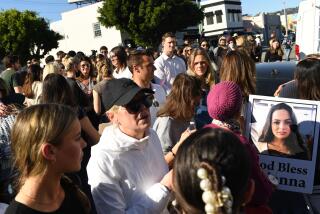Column: We mourn Brianna Kupfer. But what about the Black girl dumped along the 110 Freeway?

- Share via
When Nafeesah Kincy heard earlier this week that Pasadena police had arrested a suspect in the brutal stabbing of Brianna Kupfer, she was happy. Relieved that the family of the 24-year-old woman from Pacific Palisades might one day get closure.
Then she started to think about her 16-year-old cousin Tioni Theus and how their family may never get the same.
Shawn Laval Smith was charged with murder and the use of a deadly weapon in the death of Brianna Kupfer on Jan. 13, authorities said. He faces a life sentence if convicted.
Just days before Kupfer was found dead, covered in blood on the floor of the Hancock Park furniture store where she had been working alone, Tioni was found dead, too — shot and callously dumped like garbage along an onramp to the 110 Freeway.
Drivers spotted the Black girl’s tiny body as they whizzed by the Manchester Avenue exit in the morning traffic of Jan. 8. Some called 911. Others didn’t. Soon, the California Highway Patrol showed up and quickly launched an investigation with help from the Los Angeles Police Department.
But whatever momentum there was to solve the case seemed to disappear almost immediately.
Meanwhile, Tioni’s close-knit extended family watched with some measure of envy as Kupfer‘s slaying captured and diverted the public’s attention.
There were the dozens of media outlets, both local and national, that showed up to cover multiple news conferences and vigils. The solemn vows from police to find her killer. The $250,000 reward, partly funded by the city, for information leading to the arrest and prosecution of the man who was quickly identified as a suspect. And then there was the extensive manhunt that led to the arrest of Shawn Laval Smith, 31, while he was waiting for a bus.
L.A. City Councilman Paul Koretz said Kupfer’s killing has “shaken and shocked our community to its core.”
And L.A. Police Chief Michel Moore told reporters that, “as a father, as a police professional, as just a human being — the unimaginable pain that they must be going through losing a 24-year-old daughter, who had a bright and optimistic future.”
Indeed, as a Brentwood High School graduate, Kupfer had been taking courses for a degree in architecture and design at UCLA. Her killing was random and, therefore, scary — committed, according to police, by a complete stranger.
Tioni’s killer, on the other hand, could easily be someone she knew.
The teenager, whom her family described as vibrant and intelligent, also was no angel, they readily admit. A few years back, she experienced a crushing emotional loss, leading to trauma, flirtations with street life and run-ins with the law.
But Rashida Kincy, another of Tioni’s cousins, said that’s still no excuse for why the detective assigned to the case won’t return her phone calls.
No one from the California Highway Patrol showed up at a vigil for the teen earlier this week either, even though it was organized to renew interest in the case. And the agency took until Thursday evening — nearly two weeks after Tioni was found dead — to post a tweet requesting tips from the public.
A CHP spokesman told me there’s nothing new with the investigation. Activists have scheduled a news conference for Saturday to urge elected officials to fund a reward for information in the case, similar to what was done for Kupfer.
Tioni’s family can’t help but see what’s happening as yet another reminder of who is valued in America and who is not. And they are right.
“That’s not taking away from that child’s life being lost or what her family has experienced,” Nafeesah Kincy said of Kupfer. “I’m happy they found somebody [to arrest]. Justice needs to be served. But justice needs to be served for everybody, not just particular people.”
::

For better or perhaps ultimately for worse, Tioni Theus was fearless.
“That little girl wasn’t scared of anything. It makes me think about whoever did this to her,” Nafeesah Kincy said. “I don’t even think she was scared. That’s probably why they killed her, because she just wasn’t easily intimidated.”
Tioni got good grades, played golf and liked to dance and sing.
She grew up sheltered, self-assured and spoiled rotten — the only daughter of Theresa Theus, who, for years, wanted nothing more than to give birth to a baby girl. Once she did, mother and daughter lived in an apartment in Los Angeles, but spent a lot of time hanging out with relatives in Compton, particularly Nafeesah and Rashida Kincy.
“She had a mother that loved her dearly,” Nafeesah Kincy told me, “and took an interest in her.”
All of that changed one evening in early 2019.
Tioni was in a car with a cousin when they came upon the scene of a horrific accident that had slowed traffic to a halt. They watched as ambulances pulled up and paramedics went to work.
Just 13 years old at the time, Tioni told her cousin “that’s my mom,” Nafeesah Kincy recalled. “She said, my mama had those pants.” And, indeed, it was Theresa who was “laid out in the middle of street, blood everywhere.”
The hit-and-run accident upended Tioni’s life. Theresa survived, but hasn’t been home since.
She was in a coma for several weeks and had a breathing tube inserted in her throat for weeks after that. She has endured multiple surgeries, mostly to repair broken bones and reconstruct her face.
Today, Theresa is in a rehab facility in Whittier, where she will remain for the foreseeable future. The accident caused so much damage that she now has the mental capacity of a child.
“She was, you know, she wasn’t the same mom anymore,” Rashida Kincy told me.
Once she understood this, Tioni started rebelling. It began with long disappearances. Hours and then days at a time, telling different relatives different stories about her whereabouts, and using the confusion to sneak around.
She met a man in his 20s on Instagram, who Nafeesah Kincy says pulled her into prostitution and Rashida Kincy says used her to steal merchandise from high-end retail stores.
Tioni’s father became more involved after Theresa was hospitalized. He was the last person known to have seen his daughter alive. She left his house on Jan. 7, telling him that she was meeting a friend to go to a party. She never came home.
Politicians pushing for tougher-on-crime policies might be tempted to cite the philanthropist’s death. But she should be remembered for her life.
“She was a loving, caring person. She was smart. She was a human being,” Rashida Kincy said. “Even though I knew that she was in the streets, I never thought that this would happen to her.”
Yet, most of the people who are killed in Los Angeles County — especially in this latest, pandemic-induced spike of cruel, often-nonsensical homicides — don’t look like Kupfer. They look like Theus and they are just as troubled.
“We’re definitely not pretending that Tioni was an angel. She faced trauma,” Nafeesah Kincy said. “I want to humanize her. I don’t want her to be seen as a prostitute or a runaway or somebody that people feel like ‘Oh, well, they live that lifestyle.’”
And more than anything, she doesn’t want Tioni’s killing — or that of any other Black girl — to be forgotten or swept under the rug.
“It’s so many young women out here being victimized and being taken advantage of physically and sexually,” she said. “So it’s my cousin today. But it could be your cousin, your daughter, your friend tomorrow.”
More to Read
Sign up for Essential California
The most important California stories and recommendations in your inbox every morning.
You may occasionally receive promotional content from the Los Angeles Times.













